It was February 2016, and the pivotal South Carolina Republican presidential primary was just days away when Donald Trump made a campaign stop at Fratello’s Italian Tavern in the city of North Charleston to have lunch with longtime Mayor Keith Summey. Over ice tea and Diet Coke, Summey, a Republican, announced he was endorsing Trump. The moment was obviously planned, but the candidate feigned the kind of surprise he would later display when sycophantic Cabinet officials lavished praise on him at Cabinet meetings. “Wow!” Trump exclaimed, with cameras whirring. It was a typical event of its type—except for one rather unusual comment the endorser made. The assembled press appeared to take no notice of it when Summey looked over to Trump and referenced the candidate’s eldest son. “You’ve got a great kid,” Summey told him.
It turns out that Keith Summey and Donald Trump Jr. were not strangers. Before Don Jr. emerged as the liberal-bashing, bestselling author, a rile-up-the-base tweeter, and Fox News guest, North Charleston served as a place where Don Jr. could get away from the pressures of the Trump Organization, meet up with his longtime friend and hunting partner Jeremy Blackburn, and experiment with wheeling and dealing like his famous father. He found the perfect figure with whom to make deals in Summey, who first became North Charleston’s mayor when Bill Clinton was president.
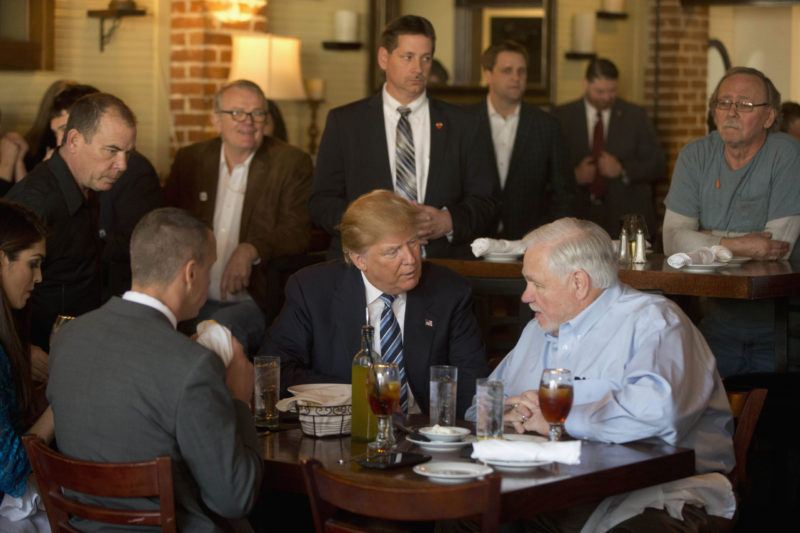
Donald Trump, accompanied by North Charleston, S.C. Mayor Keith Summey stops for lunch, Thursday, Feb. 18, 2016, in North Charleston, S.C.Image: Matt Rourke/AP Photo
Don Jr. is one of those very public figures about whom little is in fact known. He is a right-wing firebrand and archdefender of his father. At a CPAC conference in July, he said his father was right about “everything,” adding: “We’ll actually push back, right? That’s what Donald Trump did for the Republican Party. He showed that you don’t have to just turn the other cheek, roll over, and die as the other side gets whatever they want and laughs their way to the bank.” He is also well-known for hunting big game, posing (sometimes with brother Eric) over the carcasses of cheetahs and waterbucks, or with a knife in one hand and an elephant’s tail in the other. He is an executive at the Trump Organization. His girlfriend, Kimberly Guilfoyle, was once married to California Democratic Governor Gavin Newsom and gave an awkwardly overenthusiastic speech extolling her boyfriend’s father at the 2020 GOP convention. And that’s about it.
Perhaps we should know more. After all, his name is frequently mentioned in discussions about future Republican politics. He once posted a photo of himself to Instagram smiling next to a large banner reading DON JR. 2024, writing, “This will make the lib heads explode.” One July 2021 poll of Republican voters had Don Jr. showing the highest net favorables among top Republican figures, edging out Florida Governor Ron DeSantis by 1 point. The 43-year-old Trump touted his position in some polls in an interview while at the CPAC conference that month, saying he hasn’t “personally thought about” running, but adding, “who knows?” Speaking of the former president and his progeny, Seth Weathers, who was the Georgia state director of Trump Sr.’s 2016 effort in that state, has said: “I think that Trump Sr. can decide who the next 2024 nominee is. No one can beat him, and no one can beat him if he really put it on the line for another candidate.”
So Junior merits more scrutiny. It turns out that Don Jr. has engaged in at least one real estate deal that appears to follow a familiar family pattern. An investigation by The New Republic and Type Investigations found that Trump Jr. and his friend Blackburn were at the center of a real estate development deal in North Charleston involving a former naval hospital. Don Jr. and his partners made enticing promises to the city—like saying that they would open a branch of the prestigious Cleveland Clinic there. They also spoke of a glitzy Trump-branded hotel across the street.
None of that materialized. In fact, in the end, Chicora Gardens LLC, the company in which Don Jr. held a 10 percent stake, left the building a shambles. Chicora’s involvement with the hospital began in 2012. By the time Summey delivered his endorsement to Don Jr.’s father four years later, the naval hospital project that Summey had been so enthusiastic about lay in epic ruin. Whole floors were trashed. Possums, raccoons, and snakes had taken over parts of the building. “The swamp is taking the building back,” one Charleston County official told me.
And yet, the company was awarded a settlement of $33 million, courtesy of the taxpayers of Charleston County, which enabled it to pay back its loans and walk away with more than $2 million in profit—along with an untold amount of money the company made stripping copper from the building (Blackburn claims Don Jr. saw none of these profits). After all the false and broken promises, after leaving critical social service agencies in the lurch as they had planned to move into a renovated building that was instead stripped for scrap metal, Don Jr. personally pocketed at least $250,000. That payment was approved in 2017 by a local official, the county attorney, who was a longtime associate of GOP Senator Tim Scott. Three years later, as President Trump was leaving office, he made this official a federal judge.
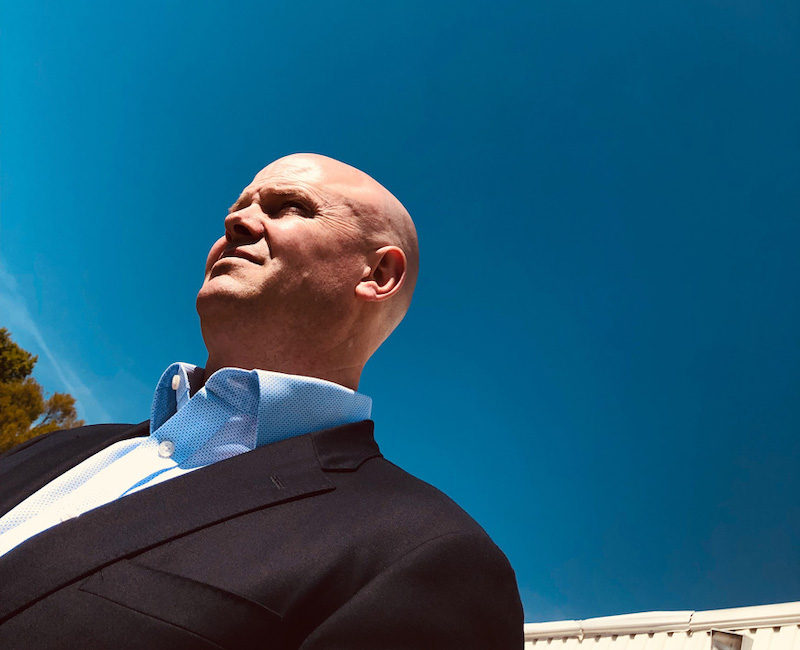
Jeremy Blackburn was one of Don Jr.’s business partners in a failed scheme to redevelop a North Charleston naval hospital.Image: Joe Rubin
The Trump Organization, asked to respond to a series of questions on Trump Jr.’s behalf, declined to comment. In a statement he gave to The Post and Courier newspaper of Charleston in 2016, Trump Jr. said: “I have an entity that maintains a passive 10 percent carried interest with no voting rights or control, and I am not involved on a day-to-day basis. I simply thought it could be a great project for North Charleston.” I found previously unreported involvement on his part, including a trip to Charleston to sell the project and the use of a confidante of his father to help get out of paying an agreed-upon security deposit.
“What they were intending to deliver to our county, to my county where I live with my wife and kids, was extremely substandard, and we didn’t want any association with that at all. Just from the pure standpoint that this is garbage,” said one key employee of Chicora who ended up resigning. The source was so concerned about the underlying problems that he worried that if the building took tenants, “someone could get hurt or killed.”
The Background: Don Jr. Comes to Town
Two miles from where Summey endorsed Trump, on 23 acres, surrounded by a chain-link fence and with a pawnshop and package store across the street, sits the 10-story, 1970s-era former Charleston Naval Hospital. The once-proud Navy hospital was built to serve a naval base that shut down in the 1990s. The hospital was shut down in 2010 and was set to go up for public auction. Building assessors said the facility was in solid shape at the time of the auction. “The sheer size, flexibility and quality of construction provide for excellent utility for many potential users,” read a 2013 building appraisal.
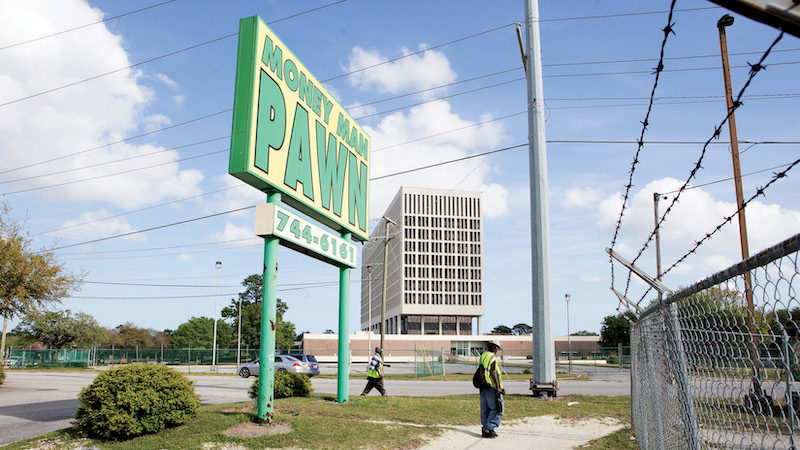
Chicora Gardens LLC, a company in which Don Jr. held a 10 percent stake, made promises that its
redevelopment of a former naval hospital would revitalize an impoverished North Charleston neighborhood.Image: Andy McMillian/The New Republic
Donald Trump Jr. first got involved in North Charleston in 2010, when he and Blackburn purchased a factory there and started a company called Titan Atlas Manufacturing. They had met back in 2000, when Don Jr. considered buying a Utah hunting ranch Blackburn was selling. That didn’t work out, but the two became friends. Blackburn even moved into the same Trump Upper West Side high-rise where Don Jr. lived with his then wife, Vanessa.
Titan Atlas was formed to build prefabricated homes for the world’s poor. C.J. Jannou, an American expat and small hotel developer based in Zambia, recalled that he met with Don Jr. at Trump Tower in Manhattan in 2010 to advise him about Titan Atlas, which had huge ambitions to send hundreds of thousands of affordable housing kits in shipping containers to the developing world. In an interview, Jannou recalled that Don Jr. pointed to the eye-popping view from his 26th-floor Trump Tower office. “Don said, ‘My dad has built all these beautiful skyscrapers and these gorgeous buildings. I can’t compete with that. But what I can do is go build millions of houses for the poor in the world,’” Jannou said. It seemed, he thought, “heartfelt, and was kind of moving.” In the end, Titan built only a handful of units, including one for Mayor Summey. Blackburn, in an interview, acknowledged that Titan fell far short of its goals but ascribed the problems to various lawsuits that hobbled the company.
Titan’s history raises its own questions about Don Jr. and Blackburn’s business practices, but that was a mere prelude to what happened with Chicora.
The federal General Services Administration put the naval hospital up for auction in 2012. Don Jr. and his partners were bidders. But so was the city of North Charleston. In October 2012, the city won the bidding for the building, paying $1.95 million. But then, things got really strange. Despite losing, Trump Jr. and his partners acted as if they had won. That was because they had: Two months after winning at auction, the city turned around and sold the building to Chicora for just under $5 million. My reporting, based on emails and interviews, suggests that Chicora’s intent was to land, with Summey’s help, a lucrative government lease against which it could borrow money. The lease would be with Charleston County. It covered 25 years and called for the county to lease around 25 percent of the building for offices and clinics offering various social services. “Don loved it because the banks loved it,” a former Chicora associate, who prepped Don Jr. for conference calls, told me.
One city councilman recalled to me a trip Don Jr. made to North Charleston around that time for a city council meeting. Ed Astle said the mayor interrupted the regular session to raise an item not on the public agenda. Summey led the group to a police auditorium to hear a pitch to sell the hospital property to Chicora Gardens. Wearing boots, his trademark slicked-back hair, and an open-collared shirt, “in walked Donald Jr.,” Astle recalled. “It was kind of like a reality-TV show, which kind of makes sense since Don Jr. was starring in The Apprentice at the time.”
Another city councilman I interviewed suggested that the whole arrangement appeared to have been worked out in advance. “I got the impression there was some kind of arrangement that would allow the city to win,” Dwight Stigler said. “‘We’re talking to Trump,’” he recalled the mayor saying. In a deposition I obtained, Doug Durbano, another Chicora partner, suggested that they were communicating about the auction. “The mayor recognized that we were bidding behind him, so to speak,” Durbano said in the deposition, taken for a lawsuit against the county. “We made a connection there, we chatted.”
Asked to comment on that and other aspects of this story, a spokesman for Summey said: “The mayor disagrees with your reporting in various regards but does not see the benefit in further discussing the matter with you.”
To comply with federal bid-rigging rules, auction participants must sign a form certifying that their bids were independently determined. Briefed on the time line, Richard Miller, a former prosecutor in California and New York state who prosecuted multiple bid-rigging schemes, said: “This certainly doesn’t look right. If I were tasked with investigating this case, there seems like quite a string to pull on. It’s not just the suspicious bidding, or the sale back to one of the bidders. It’s what followed.”
In any event, within days of the auction, Trump Jr., in a previously unreported trip, went to Charleston to meet with a friend and financial supporter of Summey’s, landscape architect Steve Dudash, to discuss the renovation project. “I recall that Don Jr. was excited about bringing an ambitious project to such an impoverished area,” Dudash said.
Dudash said that Don Jr. spoke about transforming the low-income Chicora area. It was here, said Astle and Stigler, that Durbano, the third Chicora partner, talked up their grand plans for the renovated hospital, which they would rechristen the Chicora Life Center. Stigler remembers talk of a park, a koi pond, and even a grocery store in an area that is well known as a food desert. Durbano also touted a partnership with the Cleveland Clinic to create a “destination medical center,” and with the Trump Organization to create a luxury hotel where wealthy patients and their families could stay. “That’s where Don Jr. came in, is that it would be a five-star Trump hotel,” Blackburn later said in a deposition.
When I contacted the Cleveland Clinic, a spokeswoman was baffled by the suggestion that the clinic had ever been described as part of the plan. “I’ve been here since 2002 and have never heard of this. Is it possible they used our name without our knowledge? We would know and would have been involved if this is legitimate. Sounds so odd,” said Eileen Sheil, then the executive director of corporate communications for the Cleveland Clinic.
Blackburn insisted that the conversations with the Cleveland Clinic were real, and that he had been in communication with the clinic’s “franchising division.” He provided three names of clinic employees he said were a part of the plan. I reached out to all three. Two, including Bruce Lytle, a renowned cardiac surgeon and former chairman of the Cleveland Clinic’s Heart and Vascular Institute, said they had never heard of the venture. One person Blackburn named, Sam Kiderman, told me he had indeed met Blackburn. “I vaguely recall they floated an idea, but I had zero interest and wouldn’t have been in the position to help them even if I wanted to,” Kiderman told me. He explained that his role with the clinic was to partner with biotechnology innovators, not to open up new clinics.
The Broken Promises
It’s now 2014, and Chicora is desperately trying to finalize its lease with Charleston County. After a year of behind-the-scenes negotiations, the proposed 25-year lease hit a stumbling block that January, when an investigative story in The Post and Courier by reporter David Slade raised questions about Trump Jr. and his partners. The story detailed a slew of lawsuits Titan Atlas faced, as well as past alleged fraud issues on the part of Blackburn. The three partners discussed over email with a Chicora attorney and a city attorney from Mayor Summey’s office (Summey rarely emails himself) ways to keep Slade from reporting on their dealings. The Chicora attorney worried that keeping information from Slade could make the reporter more suspicious. “I agree with that,” chimed in Don Jr.
But the project proceeded. The idea was that a bevy of social service agencies would be housed in the building—a drug-treatment center, a mental health clinic, a records office. But far from doing that, let alone establishing a branch of the Cleveland Clinic, Chicora basically wrecked the building.
The company’s own sales pitch to win the lease described a well-maintained building that needed little more than a paint job for the agencies to move in. But Chicora embarked on a renovation that unleashed asbestos, according to the Occupational Safety and Health Administration and environmental assessments done by the county, and demolished multiple floors of the hospital. This angered some local officials. It also frustrated the company’s primary lender, a small Boston bank called UC Funds, which Don Jr. had helped land, according to a bank official on the initial conference call. Greg Hayes, a UC Funds vice president, complained in an email I obtained that more than $500,000 of funds “were improperly billed and diverted.” In an email to Durbano, Hayes likened Chicora’s conduct to boarding “a flight in New York that was approved by the FAA to fly to Chicago,” but then “mid-flight, you, the pilot, decided to redirect the flight path to Hawaii knowing you don’t have FAA approval to fly there or enough fuel to get there.”
Chicora also made apparently false claims about getting an agency of the federal government, the General Services Administration (GSA), to take space in the new center. An October 2014 email from Chicora told the county to “please note” that the company had recently executed a long-term lease with “the United States Government (GSA).” But Adam Rondeau, a public affairs officer with the GSA, told me that there never was a lease, and there had been no discussion of one at that time. In an email about Chicora’s claims of a GSA lease, Blackburn said, “I don’t recall. There were lots of negotiations and actual leases signed.”
But some of the most troubling activity has to do with what more than a half-dozen people associated with the project described as a relentless drive to pull out valuable materials from the building. Tom Wood, who worked on the project for Chicora for what he called “the strangest year” of his life, remembered that he, along with Blackburn, accompanied the owner of a scrap metal company, Charleston Steel & Metal, on a tour of the hospital. “This was sometime in 2013 or early 2014, before any construction had begun, and Jeremy was excited and delighted when the owner of the scrap company told him that theoretically there was somewhere in the order of [$3 million to $4 million] of scrap metal in the building,” Wood said in an interview. From then on, Wood said, Trump Jr.’s partner “had what I would call an unusual preoccupation with salvage.”
Bernie Steinberg, the longtime owner of Charleston Steel & Metal, confirmed that he walked the building with Blackburn prior to the project commencing. “Yes, I walked the Navy hospital building with Jeremy Blackburn,” Steinberg said. “Is Jeremy Blackburn a nice guy? Is he charming? Sure. Could he charm a snake? Possibly.” Steinberg wouldn’t provide any kind of estimate of what he bought. He said that was confidential. When I interviewed Blackburn, he did not deny that Chicora resold materials, but said he was simply “recycling.”
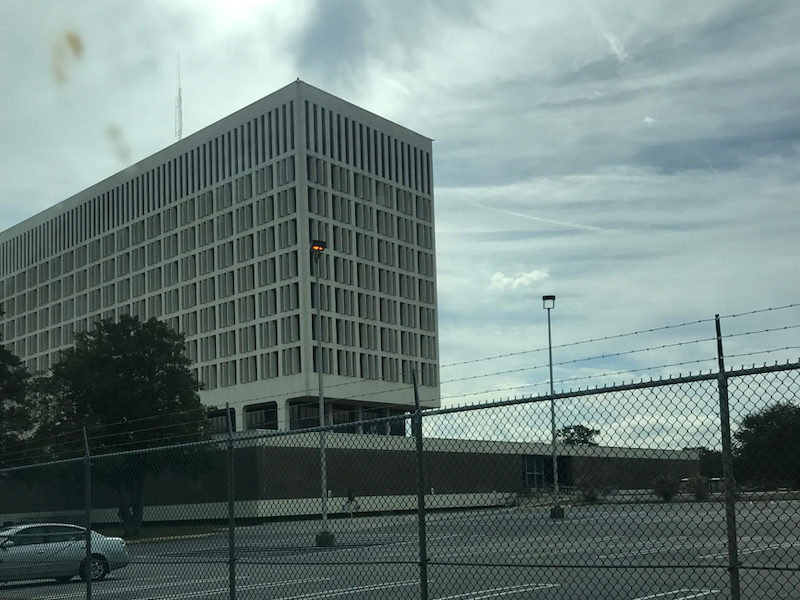
Today, almost a decade now after Don Jr. and his partners’ promises, the naval hospital still stands but is not being used.Image: Joe Rubin
However, others found the aggressive stripping unusual. LaShaun Smalls, owner of an electric company, was hired as a contractor to wire up parts of the hospital. Smalls said things were extremely chaotic from the moment he arrived on the job. “There was a whole lot of focus on demolition,” he recalled. “They had Bobcats taking out walls, unskilled people yanking copper, pipes, wires, anything they could find.
“To be honest, it felt like a real-life Sopranos episode at times,” Smalls said. “They stripped the existing wire, which was strange because it was in good shape. Then they had me rewire the floor. The next day, I see lights flickering in an area we had just finished. I went to investigate, and I see guys pulling out the wire that I had just put in the day before. It was nuts.” The coup de grâce here: Smalls, who is Black, said he was never paid in full, and he ended up declaring bankruptcy.
Finally, there was the penthouse. Chicora demolished a crucial machine room in an area of the hospital the developers referred to as “the penthouse.” Blackburn often gave tours of the building and had envisioned various amenities on the top floor, including luxury apartments where he and Trump would have residences, several sources said. The problem was that the space was packed with equipment connected to the complex HVAC system.
When I asked Blackburn about the demolition of the machine room, he ridiculed the question in an email he copied to Don Jr.: “Another laugh out loud moment, thank you. What crucial machine room did we rip out? I can’t wait to hear. Surely it is not the 50-year-old air handlers that failed as part of an ancient pneumatic HVAC system….?” An April 2014 appraisal of the former Navy hospital that I obtained shows that the company claimed the equipment was not needed. “We were told by a representative of the owners that the systems were redundant,” the assessment said.
But others insisted the equipment was essential for heating and cooling the building. Earl Brown, the former facilities manager at the naval hospital, said that the description of the systems on the top floor as redundant did not make sense to him. “There were major components that were essential to the operation of heat and air conditioning on that floor,” Brown said. “The building wasn’t designed to operate without them.”
No account from inside the troubled project is more damning than that of former Chicora security director Eric Franklin. Although he had been hired by Chicora as someone they could trust because of his background as a military intelligence officer, Franklin became disillusioned with the copper stripping and overall “lawless atmosphere” he was witnessing. The thing that got him, Franklin said, was “the idea of that place was so needed, but the reality was just rotten, a crime scene really.”
Franklin turned whistleblower, TNR and Type Investigations exclusively learned, after he was ordered to have his security officers regularly deny entry to a county official, a former Pentagon architect named Ed Lee, who was familiar with the Navy hospital and who was supposed to have unrestricted access to the job site. But Chicora’s construction manager, Karl David—who, TNR and Type Investigations exclusively discovered, pleaded guilty to construction-related fraud felonies in a neighboring South Carolina county while he was working for Chicora—acknowledged that, rather than aiding Lee, under orders from above at Chicora he regularly instructed Chicora’s security staff (led by Franklin) to keep Lee out of the building. David told TNR and Type Investigations that Lee was “very much against the project.”
All the while, the “renovation” was wrecking the building. In a series of text messages to Lee that I obtained under a Freedom of Information request, Franklin shared photos of the project. “These are pics from the last two weeks, the reason that you can’t come in. I may lose my job, but won’t be a part of any lies,” Franklin’s first text message said. The pictures included gutted ceilings and photo after photo of flooding, which, according to Franklin and others, resulted from the stripping operation. Curiously, there were also photos of stacked-up TRUMP FOR PRESIDENT signs. Franklin, who is African American, explained the significance to me. He said prior to that crucial 2016 South Carolina primary, Blackburn assigned teams of workers to take the campaign signs and place them all over Charleston. “I refused that assignment,” Franklin told me. “I told Jeremy I wasn’t going to be their house Negro.”
The Trump Organization’s Involvement
In exchange for getting the right to do the work on the hospital, Chicora made two promises. It delivered on neither of them. It agreed to finish the renovations by January 2015, a deadline it clearly didn’t come close to meeting. But the story of the second promise is more eyebrow-raising.
Chicora agreed to provide Charleston County with a $1.3 million “irrevocable letter of credit”—a security deposit, in essence, in case things went wrong. Victor Rawl, one councilman who supported the deal, said in an interview that he would not have approved the deal without this promise.
Chicora’s bank, UC Funds, set aside the money in an escrow account. But no more than six weeks later, Don Jr. turned to an associate of his father’s to help undo the arrangement so Chicora could gain access to the money to pay off legal fees and other debts. Pamela Newman was President Trump’s longtime insurance broker at Aon, which, according to The New York Times, is “one of the largest insurance brokerage firms in the world.” In 2019, shortly after Michael Cohen went public saying that the Trump Organization regularly inflated the value of its properties to get favorable terms from banks, the Manhattan district attorney’s office subpoenaed Aon.
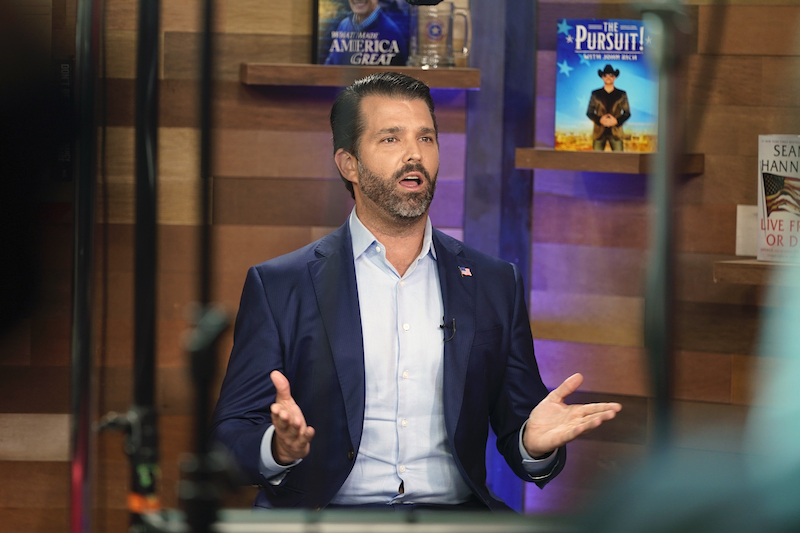
Donald Trump Jr. does little to discourage speculation about a political future.Image: John Raoux/AP Photo
Trump Jr. had a conference call with Newman and other Aon executives to discuss the deposit, according to a calendar invitation and one person with knowledge of the call. Aon then drafted a letter suggesting that the letter of credit was problematic. But three construction finance experts who reviewed the lease and other documents for TNR disputed those concerns. One of them, Sean Thompson, said Aon’s letter is really just “confusing jargon” and called Chicora’s reliance on it a “misleading tactic to back out of a financial commitment.” Nevertheless, Kurt Taylor, the Charleston County administrator, agreed to Aon’s argument and signed an agreement eliminating the $1.3 million deposit. Chicora then immediately petitioned its lender to grant it access to the funds.
Adding to the intrigue here is the fact that candidate Trump was later caught on tape talking, with someone apparently named Pam, about another “Charleston thing.” This was a September 2016 recording surreptitiously made by Michael Cohen that became most famous for Trump and Cohen’s discussion of payments to Karen McDougal, a former Playboy model who claimed to have had an affair with Donald Trump Sr. But the recording opens with Trump talking on the phone to someone else (not Cohen), saying: “I think what—I think it’s better to do the Charleston thing, just this time. Uh, yeah. In two weeks, it’s fine. I think right now it’s, it’s better. You know? OK, honey. You take care of yourself. Thanks, Pam. Yup, I’m proud of you. So long. Bye.”
The recording was made public in July 2018, and media speculation immediately turned toward the idea that “Pam” was Pam Bondi, the Florida attorney general who dropped a probe into Trump University after Trump gave her a substantial campaign contribution. Bondi denied at the time that it was her, saying, “I spoke to the president frequently, but I don’t think it’s me.”
Cohen confirmed to me that Don Sr. was in fact talking to Pam Newman, who had gotten Don Jr. out of that $1.3 million commitment two years before. This time, Newman was being called to help bail Don Jr. out of a dispute over a leaking roof at the former factory plant of Titan Atlas Manufacturing, Junior’s failed housing venture. “I think what you should do is get rid of this,” Trump Sr. told Newman in the fall of 2016. “Because it’s so false what they’re saying, it’s such bullshit.”
The County Official Who Became a Federal Judge
The last and perhaps most interesting part of the Chicora story involves a man named Joseph Dawson III, who at the time of all this was the Charleston County attorney. Dawson is the key figure who negotiated the $33 million payment by the county to Chicora—and who later was made a federal judge in the waning days of Donald Trump’s presidency.
The story here is as follows: In March 2016, the county, having grown frustrated by all the delays and the failing HVAC system and the broken elevators and more, canceled the lease with Chicora, writing that the company had failed to make the premises “ready for occupancy.” Chicora declared bankruptcy and sued the county for breach of contract, citing numerous unexpected costs and accusing the county of violating the terms of the lease.
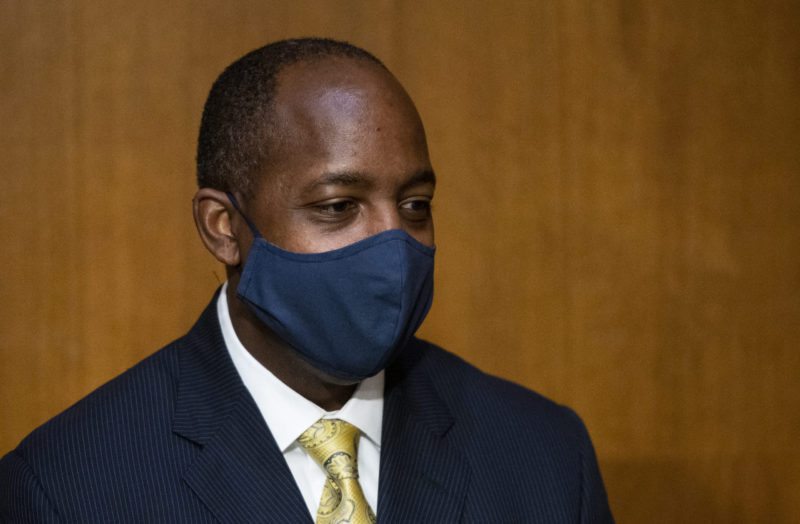
Joseph Dawson III, nominee to be United States District Judge for the District of South Carolina, prepares to testify during his Senate Judiciary Committee confirmation hearing on Wednesday, Nov. 18, 2020.Image: Bill Clark/CQ Roll Call
It’s the kind of move Donald Trump Sr. made many times: Sue the party you’ve dragged through the muck. But Chicora had a legal justification, courtesy of Dawson. As the January 2015 completion deadline approached, the county removed the deadline from the lease. It was clear the deadline would not be met, minutes from private meetings show. Taylor, the county administrator, summoned Blackburn to his office in early December 2014 to discuss the matter. Initially, the county mulled a brief extension, but two days before the scheduled move, an amendment was executed that did something highly unusual, according to multiple legal experts in construction. It eliminated the performance deadline entirely, striking any completion date. “Even if the county wanted to help out Chicora, which they had zero legal obligation to do, they could have simply extended the deadline. The elimination of this date defies any reasonable, above-board explanation,” Sean Thompson, the expert in construction law, told me.
The question of who approved the removal of the deadline is an important one. Taylor and a Summey loyalist signed the document removing the deadline, but it was drafted by Dawson, the county attorney. He acknowledged as much in a deposition I obtained.
Taylor, who retired in 2015 amid growing backlash to the project, defended his role in the project and blamed Dawson for eliminating the deadline. In an email, he said, “The deal I was involved with protected the county. After I left, others made changes and followed poor policy decisions.” He was later hired as general counsel for a new real estate venture called Black Ink Holdings. Its CEO is Blackburn.
In June 2017, the bankruptcy judge, hearing Chicora’s breach of contract claims, issued a favorable ruling for Chicora, citing several legal missteps by the county, principally the elimination of the deadline. As a result of that ruling, the county opted to pay Chicora $33 million, enough to settle its $30 million in debts and still clear a profit, even though it had basically ruined a building that it once promised would rise as a revitalizing jewel in a poor neighborhood. Don Jr. personally walked away with $250,000. Blackburn defended the payment to me, saying, “If the county believes that the project wasn’t done, why did they offer to pay $33 million for the building?”
Dawson was the man who OK’d the $33 million. He also tried to hide the contents of 28 depositions taken for the lawsuit, maintaining that they were attorney-client privileged. But Paul Nicholas Boylan, a California-based attorney who teaches and practices First Amendment and public records law, said that Dawson’s decision to withhold the depositions was “clearly wrong. Deposition transcripts are, by their very nature, simply not confidential…. I am unaware of any statute or rule of evidence in any American jurisdiction, including South Carolina, that suggests otherwise.” TNR and Type Investigations obtained the depositions from another source.
Dawson, a graduate of the University of South Carolina Law School, was being vetted by the White House at the time he was trying to keep those depositions secret from my reporting. He was formally nominated to the U.S. District Court for the District of South Carolina by President Trump on October 23, 2020, at the recommendation of Senator Scott. The Senate Judiciary Committee held a hearing on his nomination on November 18, at which point Trump was a lame duck. He made it through the committee with a mostly partisan vote of 56–39. In written questions, Senate Judiciary ranking member Dianne Feinstein asked Dawson about his role in the failed naval hospital development. Dawson responded, “all communications I had with Charleston County Council are protected by the attorney-client privilege and the work product doctrine.”
It turns out, though, that Dawson didn’t entirely leave the county payroll. In a secret agreement with Charleston County, drafted by Dawson himself, the county agreed to continue to pay Dawson $216,000 for “advice” he might offer the county during his first year as judge. Additionally, the county agreed to compensate Dawson 1.5 percent from any opioid settlement money the county may receive from its ongoing lawsuit with Purdue Pharma. “That’s just beyond the pale,” said Gabe Roth, executive director of Fix the Court, a nonpartisan judicial watchdog that filed a complaint of judicial misconduct against Dawson after The Post and Courier revealed the compensation. The 1.5 percent element of the agreement was rescinded in May 2021, but Roth’s complaint, which states that the code of conduct for federal judges forbids such outside income, is still pending. Dawson did not respond to a request for comment.
Today, almost a decade now after Don Jr. and his partners’ promises, the naval hospital still stands but is not being used. The county announced plans to construct a social services center and to sell the building to a developer who says it will be turned into apartments. But having toured the wrecked building, I find it hard to imagine that. Engineering reports commissioned by the county estimated that getting it up to code would cost a whopping $66 million. Chicora remains in court. It is suing a nonprofit mental health center funded by the state. Another lawsuit against a low-income health clinic was rejected by a Charleston County judge in 2019, who found that “these premises were not ready for any use.” And the taxpayers of Charleston County are neither the first nor the last group of people to learn firsthand how expensive an encounter with a Trump-related entity can be.
This story was produced with support from the Wayne Barrett Project.